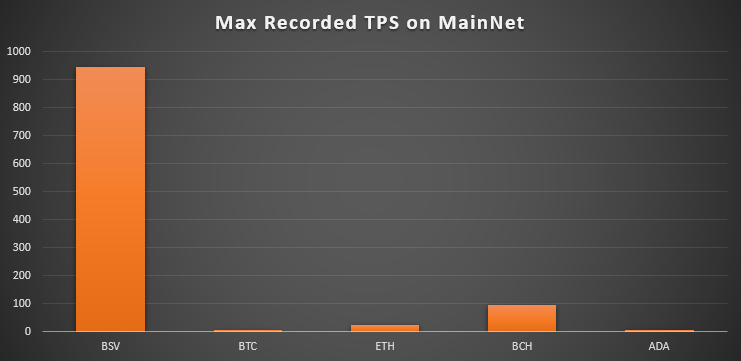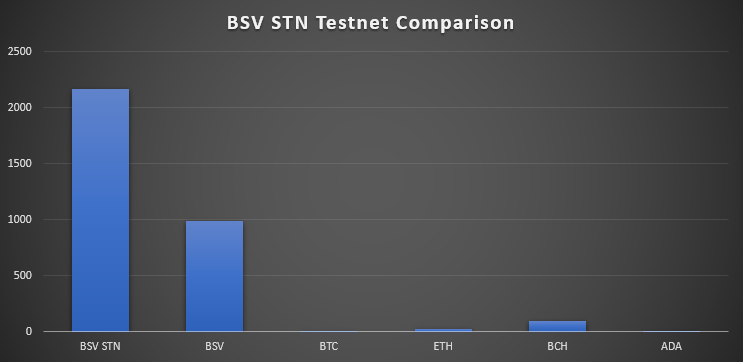|
Getting your Trinity Audio player ready...
|
There’s a prevailing rhetoric amongst digital currency enthusiasts and ‘personalities’ that says “blockchains don’t scale,” or that they don’t scale well. It is this rhetoric that has convinced a large swathe of BTC loyalists, to fall behind the “off-chain” mantra. Year on year, we see blockchain conferences discuss the wonders of the technology, and in the same breath they utter that taking things ‘off-chain’ is somehow a good thing. The duplicity is real folks!
For many of these personalities who have spent countless hours fighting against putting data on-chain, Bitcoin SV (BSV) represents an adversity that challenges their entire ethos. It is for this reason, you hear of the Adam Backs of the world bemoaning the fruits of BSV; it is proving them all wrong day by day.
While BTC lobbyists believe only monetary transactions should be on chain (and of those strictly valuable transactions), Bitcoin SV welcomes all data of the world that is worth anything. You couldn’t have a more polarising opinion on something except for, perhaps God and Satan.
Somewhere in between those two polarising regions of thought fits the slew of all the variety of altcoins, each that deems themselves worthy of recording some type of specific dataset. But no other project encapsulates the entirety of valued data. Bitcoin SV does.
The philosophy of chain is only a small part of the puzzle. The real kicker is that the philosophy is entirely backed by technical prowess. Evidently, as we have seen time and time again, BSV keeps setting transactional world records ablaze. Both on mainnet and testnet.
By metrics alone, BSV stands as the king of blockchain tech. Let’s leave promises of future capabilities aside (the blockchain space is riddled with false promises)—and focus on the current standings.

The above graph is not one based on results that are dictated on paper or in the lab. This is a metric of what has been demonstrated so far, on the live public blockchain.
Technically, if you look at the blockchain stats alone, BSV has on record pushed out over 3500 transactions per second. This happened with TAAL’s world record setting 309MB lock. However, that number has been intentionally omitted from the graph as the processing by TAAL was not done under ordinary circumstances.
Then there’s Bitcoin SV STN network, which is a testnet specifically setup to test BSV’s scalability. This has peaked at over 2400 TPS recently.

But as Daniel Connolly, lead developer of Bitcoin SV Node software says, it’s not the peak performance, but rather the sustained performance that is important. Looking at peak performance is a false measure of security that many projects are guilty of doing. But even so, on the STN, BSV has attained a sustained performance of 1426 TPS across 8 hours. That is indeed impressive.
Undoubtedly, opposers that view this will be quick to jump on the “promises” bandwagon. Yes—it’s true Ethereum has Casper in the pipeline which will substantially increase its throughput, and Cardano has things in the pipeline which will catapult its throughput… but and? Do you think BSV node engineers are just sitting there twiddling their thumbs? BSV too, has Teranode in development which will dwarf the current numbers. But let’s not get too carried away with promises—I despise them.
BSV’s philosophy on hard and fast scaling means that nodes are not some hobbyist’s machines. The BTC refrain that “everyone needs to run their own node” is a sure way of making sure your blockchain never ever scales.
BSV is fixed on ending up in data centres—and true to Satoshi Nakamoto’s whitepaper, it lets users be users. BSV does not burden everyday users with having to keep a ledger of the entire history of transactions, as BTC is obsessed with doing. BSV intends for its blockchain to host the future of the internet, which we have dubbed the “Metanet”. Nobody today expects you to have the entire internet on your node, and nor does Bitcoin expect you to have the entire Metanet on your node either.
Users can be users – and they can still operate securely using SPV proofs. SPV, which stands for Simplified Payment Verification, is a method that Satoshi Nakamoto first described in the Bitcoin whitepaper on a very high level. At global scale, SPV wallets are an absolute necessity. The overarching concept is simple, but the details of the method were omitted from the whitepaper, and nChain now have a patent on the method. This ensures the protection of the technology—SPV to the original Bitcoin protocol that survives in BSV. This solidifies its future for scaling.
According to Dr. Wright: “Users in the system are only required to maintain a copy of the block header to which they can compare transactions. At present, the block header is under 50 MB in size. Many image files can exceed such levels. A decade from now, the growth will only be linear. So, we have a system that scales by Moore’s law exponentially yet takes a linear amount of resources. There are a few systems that could not keep block headers in memory today.”
In other words, every day mobile Bitcoin wallets will forever be usable as far as secure, verifiable wallets go.
If any other blockchain wishes to scale globally and somehow avoid having every user run their own node, then they’ll have to find a new way of doing it.
BSV has advanced leaps and bounds above the competition and it is no doubt that so many enterprise companies around the world are beginning to take notice. There is only one blockchain project that has not only proved its willingness to scale but has demonstrated this willingness and has future proofed its scalability path with a swathe of inventions and patents to protect it. If you believe that businesses should avoid patents because of your morale compass, do have a read of my earlier piece on why ‘anti-patents’ are bad for business.
Eli Afram
@justicemate

 02-26-2026
02-26-2026 




